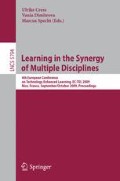Abstract
The scope of our research is to build a non pedagogical intelligent assistant, I-CAN (Intelligent Coach and Assistant to New way of learning) that supports students during their academic schooling and prevents them from dropout. The management of learner’s motivation is one of the main features for schooling success. A high level of motivation implies more engagement and positive emotion to overcome difficulties. The problematic of this paper is “How to enhance the student’s motivation during his academic schooling?” We propose a motivation management framework for a personal intelligent assistant on a LMS (Learning Management System). This framework takes in input data from learner’s academic schooling (absenteeism, tardiness, marks, tasks, sanction) to diagnose learner’s state and to enhance the motivation to learn through an embodied conversational agent.
Access this chapter
Tax calculation will be finalised at checkout
Purchases are for personal use only
Preview
Unable to display preview. Download preview PDF.
References
Beck, J.E.: Using response times to model student disengagement. In: ITS2004 Workshop on Social and Emotional Intelligence in Learning Environments. Maceio, Brazil (2004)
Blanchard, E., Frasson, C.: An Autonomy-Oriented System Design for Enhancement of Learner’s Motivation in E-learning (2004)
Cocea, M., Weibelzahl, S.: Cross-system validation of engagement prediction from log files. In: Duval, E., Klamma, R., Wolpers, M. (eds.) EC-TEL 2007. LNCS, vol. 4753, pp. 14–25. Springer, Heidelberg (2007)
De Vicente, A., Pain, H.: Motivation diagnosis in intelligent tutoring systems. In: Goettl, B.P., Halff, H.M., Redfield, C.L., Shute, V.J. (eds.) ITS 1998. LNCS, vol. 1452, pp. 86–95. Springer, Heidelberg (1998)
Du Boulay, B., Rebolledo-Mendez, G., Luckin, R., Martinez-Miron, E.A., Harris, A.: Motivationally intelligent systems: Three questions. In: Second International Conference on Innovations in Learning for the Future (2008)
Ginot, H.: Teacher and child. Congruent Communications, Inc., New York (1972)
Hershkovitz, A., Nachmias, R.: Developing a Log-based Motivation Measuring Tool. In: 1st International Conference on Educational Data Mining, Montreal, Canada (2008)
Huitt, W.: Motivation to learn: An overview. Educational Psychology Interactive (2001)
Kim, Y.-S., Cha, H.-J., Cho, Y.-R., Yoon, T.-B., Lee, J.-H.: An Intelligent Tutoring System with Motivation Diagnosis and Planning. In: 15th International Conference on Computers in Education (2007)
Qu, L., Johnson, W.L.: Detecting the learner’s motivational states in an interactive learning environment Artificial Intelligence in Education. The Netherlands, Amsterdam (2005)
Rebolledo-Mendez, G., Du Bouley, B., Luckin, R.: Motivating the Learner: An Empirical Evaluation. In: International Conference on Intelligent Tutoring Systems, Jonghli, Taiwan, pp. 545–554 (2006)
Ryan, R.M., Deci, E.L.: Self-determination theory and the facilitation of intrinsic motivation, social development, and well-being. American Psychologist (2000)
Zhang, G., Cheng, Z., He, A., Huang, T.: A WWW-based learner’s learning motivation detecting system International Workshop on Research Directions and Challenge Problems in Advanced Information Systems Engineering, Honjo City, Japan (2003)
Weibelzahl, S., Kelly, D.: Adaptation to Motivational States in Educational Systems. In: Proceedings of the workshop week Lernen-Wissensentdeckung-Adaptivität (2005)
Author information
Authors and Affiliations
Editor information
Editors and Affiliations
Rights and permissions
Copyright information
© 2009 Springer-Verlag Berlin Heidelberg
About this paper
Cite this paper
Tran, T.D., Marsala, C., Bouchon-Meunier, B., Putois, GM. (2009). A Model to Manage Learner’s Motivation: A Use-Case for an Academic Schooling Intelligent Assistant. In: Cress, U., Dimitrova, V., Specht, M. (eds) Learning in the Synergy of Multiple Disciplines. EC-TEL 2009. Lecture Notes in Computer Science, vol 5794. Springer, Berlin, Heidelberg. https://doi.org/10.1007/978-3-642-04636-0_60
Download citation
DOI: https://doi.org/10.1007/978-3-642-04636-0_60
Publisher Name: Springer, Berlin, Heidelberg
Print ISBN: 978-3-642-04635-3
Online ISBN: 978-3-642-04636-0
eBook Packages: Computer ScienceComputer Science (R0)

